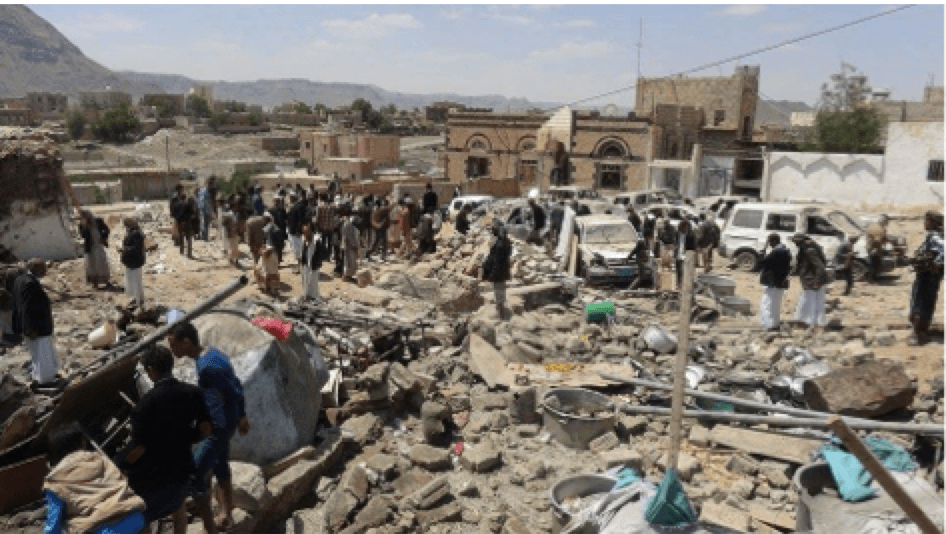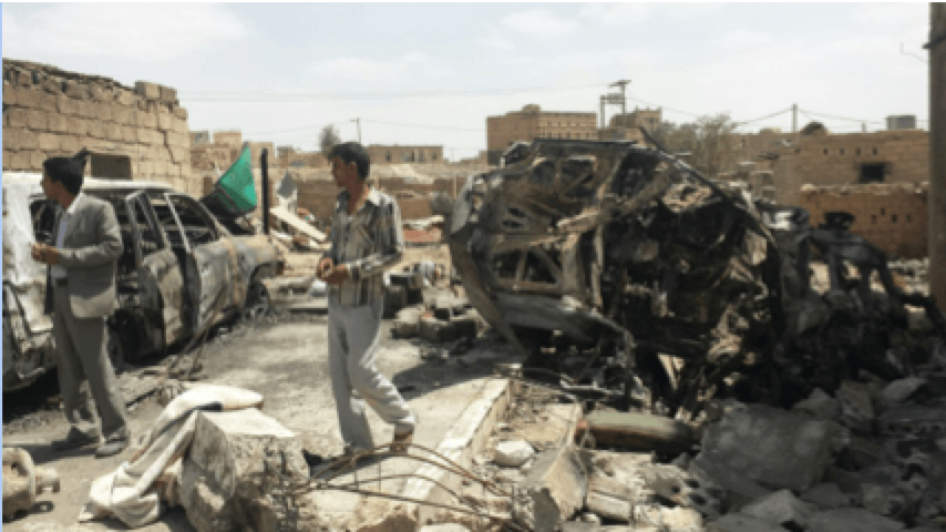It was an October night and the al-Sanabani family was readying to celebrate the wedding of three couples. It was around 9:30 p.m. when Muhammad Jamal Saleh Ghouba al-Sanabani arrived at his relative’s home, where the wedding was to be held, to take part in the celebration.
Then, Yemen’s war caught up with them.
“I heard whizzing for a moment, then came the explosion,” al-Sanabani, 33, told Human Rights Watch two weeks after a warplane bombed his relative’s home. “It was a huge explosion inside the yard. The sky turned red. I didn’t realize at that moment it was an airstrike and still now also can’t believe it – it’s like a nightmare that plays before my eyes.”
Instead of celebrating his cousin’s marriages, al-Sanabani spent the night trying to dig the wounded out of rubble, searching the wreckage in hopes of finding his mother and small daughter alive.
Since March 26, 2015, a Saudi Arabia-led coalition of nine Arab countries with direct US support has carried out a military campaign against the Houthis, who ousted the former government and now control much of Yemen. Human Rights Watch and others have reported on numerous indiscriminate airstrikes by coalition forces that have killed and wounded hundreds of Yemeni civilians. No investigations are known to have been conducted into alleged unlawful attacks as required by international humanitarian law.
Families began gathering for the wedding at 9 p.m. that October 7, when the families brought the three brides -- Khetam, Hana, and Jamila -- to the home of al-Sanabani’s relative, Muhammad Saleh Ghouba al-Sanabani. The house sat atop a small hill overlooking the village of Sanaban, about 150 kilometers south of Sanaa. The brides were to be wed that night to three of the elder al-Sanabani’s sons – Moayed, Ayman, and Abd al-Rahman. Throughout the evening they heard jet planes overhead, but they did not believe they were in danger because planes had flown in the area before without conducting any strikes.
Al-Sanabani told us he and his wife had just arrived at the house along with four of his brothers. By 9:30 the procession of grooms to their father’s home was nearly finished. His own father was standing at the gate of his house, just 10 meters away when a bomb from a coalition warplane struck the compound next to the ground-floor room of his father’s home where the women and girls had gathered.
Gas cylinders, diesel and petrol stored for the wedding exploded, setting fire to the building. Al-Sanabani was thrown to the ground, disoriented by the pressure of the explosion. When he recovered, he headed to the house, afraid for his mother and his daughter, Joud, whom he believed were inside with about 50 other women and girls.
He saw his brother Jameel on the ground, who told him to find their father. “It was a big shock when I saw [my father],” al-Sanabani said. “He was different— swollen and split in half. I can’t describe the scene. My father, only 65-years-old, dead.”
Rubble covered the gate to the house. Al-Sanabani said he and a few other men pried open the gate and helped a few women out. They went inside. He heard a voice calling for help.
“I saw one of my cousins inside covered with rubble, except for her head, which was visible,” he said. “It was a very difficult situation. She was calling me by name, begging for help. She was terrified and crying. I tried to help her but I couldn’t do anything—the roof was falling on top of us.”
Others showed up to help in the rescue effort. They were able to extract al-Sanabani’s cousin – her face had been disfigured and she had lost an arm. Altogether, 18 women and girls were buried under the rubble in the room.
Al-Sanabani began searching for his mother and daughter. He saw women evacuating from the second floor of the house by ropes tied to the windows. The fire kept growing, so he left the building to see if his mother and daughter were in the yard.
He learned that his 30-year-old brother Essam had been killed along with Essam’s son Muhammad, 5. An uncle had died as well.
The fire died down after about 45 minutes. Al-Sanabani found his mother’s remains inside the compound. They were “charred and burned,” he told us. Neighbors said he might find his daughter Joud in nearby houses, where others had taken some children. He found his 8-year-old son Jamal but still could not find his daughter.
“The next afternoon at 1 o’clock, some people brought a body to the mosque to be buried after prayers,” al-Sanabani told us. “Someone came to ask me to check if she was my daughter because they couldn’t tell -- the body was so charred. I refused to look at her in such shape. They brought to me the only thing that was left – her hair clip. I gave it to her mother, who immediately recognized that it was hers.”
In addition to the destruction of the Al-Sanabani home, 25 other homes in the village were also damaged in the airstrike. Al-Sanabani and other residents said there were no military targets in the vicinity, no Houthi forces, not even a checkpoint. Altogether the airstrike killed 43 people, including 13 women and 16 children. Dozens were wounded. The victims and their families have received no compensation from any coalition country.





